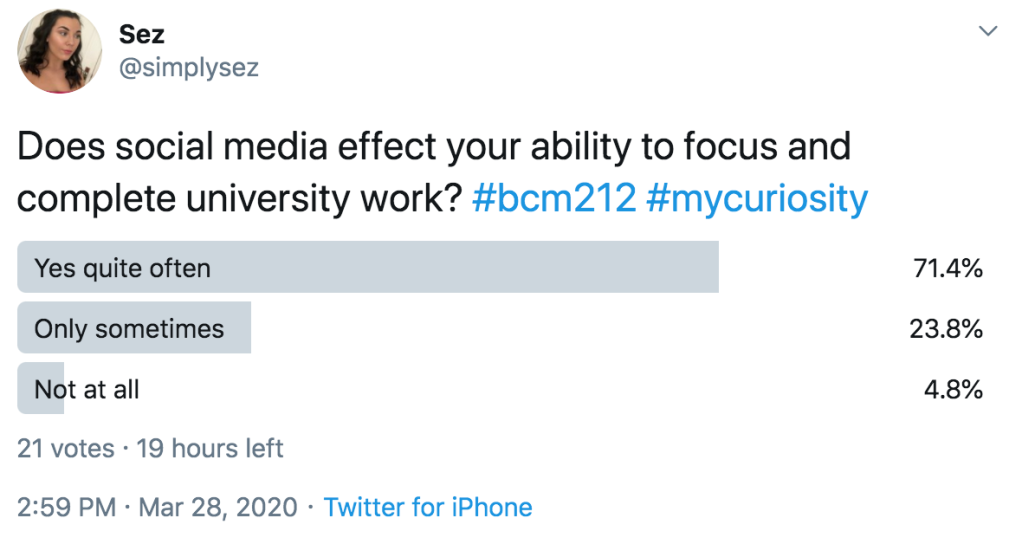We are currently living in an increasingly digital world where individuals are finding themselves more reliant than ever on social media networks. Consequently, social media has inevitably become apart of many university students experiences and can impact one either positively or negatively. In particular, various studies have identified social media as a factor contributing to university students procrastination.
This makes me question how does social media affect one’s ability to focus and complete university work? To what extent is social media used as a means of procrastination from university tasks? Does the incorporation of social media networks, such as Twitter into one’s degree lead to increased procrastination? Do students use social media as a form of fulfilment and distraction from academic work?
Sources
One such way in which social media can impact university students is through their use within lectures. Evidence for this is presented within the academic journal ‘Social media use in lectures…’ where it is found that higher levels of social media use within lectures lead to increased procrastination amongst students (Rozgonjukab, Mari Kattagoa & Tähta 2018). This source also identifies that this use of social media can have a negative impact on students. This being as, a link between procrastination leading to poorer academic performance was established. Evidently, this study highlights that there is a basis for further exploration of this issue.

A journal article ‘Social media cited as largest source of procrastination’ by Rachel Morford reported on statistics from research conducted surveying 1500 US undergraduate students. This survey found that 74 percent of respondents agreed that, the extent to which “internet distractions fueled their procrastination was significant and worrying” (Morford, 2014). Furthermore, 64 percent of students declared that they have in fact lost their train of thought during a study session as a result of them responding to social media notifications. In addition, 44 percent identified that they were concerned about the “quality of their work decreasing” as a result of procrastination (Morford, 2014). Essentially, this article conveys the high extent to which social media can act as a catalyst for procrastination and distraction amongst university students.
It has been established that social media can be used as a form of procrastination amongst university students however, the reasoning for this is also something worth delving into. Research within the academic journal ‘Social network site use and university adjustment’ highlighted that social media can be used as a form of gratification to help satisfy social, emotional and informational demands (Closson & Bond, 2019). Consequently, this study also links students need for breaks whilst doing academic tasks with seeking this enjoyment and distraction through forms of social media.
The academic journal, ‘Permanently online and permanently procrastinating?’ further reinforces the notion that online content on networks such as social media acts as a catalyst for procrastination. This source links this form of procrastination with the need for “short-term mood optimization” (Reinecke, Meier & Aufenanger, 2018). This relates to the point previously made that students often look for fulfilment and gratification away from their academic work through the use of social media. In addition, a study on students presented by Quan-Haase and Young (2010) found that respondents admitted to using social media as a way to “get away from pressures and responsibilities” and “put off something I should be doing”.
Why is this project timely, relevant and achievable?
As this research project is only targeting a small sample of university students I believe I will be able to achieve it within a timely manner. This being as I speculate that 10 weeks will be an adequate amount of time to gather the information and responses needed within this project. In addition, as there is various secondary research already existing in relation to my research question I will be able to draw upon this material to further assist my project within the limited time frame I have.
I believe my research question is immensely relevant as social media is a contributing factor in a large majority of university students lives. In particular BCM212 students are required to use social media, more specifically Twitter, within our degree. Hence, reviewing the impact of this network on students concentration would be extremely relevant as it’s apart of our own university experience.
Additionally, this project will be achievable because my methods of research are accessible to other students. This being as I can utilise polls and surveys to easily collect data from other students. For example, I conducted a poll on Twitter asking BCM212 students about whether or not social media affects their ability to focus and complete university work. I was meet with a relatively positive response and interaction within a short amount of time and no promotion. This being as 71.4 percent voted yes quite often and 23.8 percent voted for only sometimes. Consequently, this highlights how this task is both achievable and relevant to the university experience.

References:
Closson & Bond, 2019, ‘Social network site use and university adjustment’, An International Journal of Experimental Educational Psychology, vol. 39, pp. 1027-1046
Morford, 2014, ‘Social Media Cited As Largest Source Of Procrastination’ – The Huntington News, viewed 23 March 2020, <https://huntnewsnu.com/36142/campus/nu-students-admit-social-media-as-largest-source-of-procrastination/>
Reinecke, Meier & Aufenanger, 2018, ‘Permanently online and permanently procrastinating? The mediating role of Internet use for the effects of trait procrastination on psychological health and well-being’, vol. 20, pp. 862-880.
Rozgonjukab, Kattagoa & Tähta, 2018, ‘Social media use in lectures mediates the relationship between procrastination and problematic smartphone use’, Journal of Computers in Human Behaviour, vol. 89, pp. 191-198.
Leave a comment